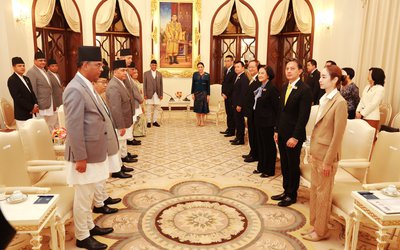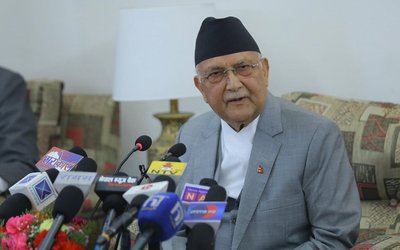
Nepal experimented with various development models in the last six decades of its modernization process, but only a few books have taken up to deal directly with this topic. Written by Mainali and Paudyal, the book on contemporary dimensions of development is the first of its kind in analyzing these different aspects of development.
Having spent over three decades in various positions in the Civil Service, Mainali has vast experience and knowledge of implementing development programs and projects. This is reflected in the book. Similarly, another writer Mukunda Prasad Paudyal is a serving joint secretary with the background in micro-economics. Thus, the book brings rich discourse perspectives in discussing the dimensions of contemporary development.
Development is not merely a change in the livelihood of man or building of infrastructure. Development is all about changing the overall state of human being. It changes not only physical things but also cultural, social and economic aspects of life.
This is what the book says. Former secretary Mainali and joint secretary Paudyal analyze and discuss the issues of development looking at the present state of Nepal. With the new and aspiring gazetted officers in mind as audiences, the book highlights aspects that are going to be very helpful for those who want to attend the Civil Service Commission's examinations. Serving in more than half the ministries, like Ministry of Local Development, Ministry of Labor and Transport, Water and Energy Commission and Public Service Commission during his career in civil service, former secretary Mainali knows what matters to the work of civil servants.
This book will be also helpful as a reference material for those who want to know Nepal's contemporary development agenda and state of Nepal's development process. Along with analyzing the development process, the author duo also discuss the lacuna of development in Nepal.
"This book is prepared for the Third Paper of Gazetted third class officer examination of the Public Service Commission. This book will also be useful for various levels of university students in Nepal, particularly those studying development and environmental issues," said Mainali.
The book is divided in four parts. The first part deals with social issues; second, multi-dimensions of development; third, issues related to development; and fourth, issues related to environment.
The authors discuss social disputes and conflict, social justice and equality and social and cultural transformation, distributive justice of resources, inequality and marginalization, social protection, social security and social responsibility. Development is deeply rooted in cultural diversity. Thus there are also separate pages for cultural diversity and population, organized crime, food sovereignty and food security.
Economic growth and economic development, important aspects of economic development, role of public sector, private sector and co-operatives in economic development, foreign assistance and international co-operation, foreign investment, transfer of technology, trade, market and labour liberalization, economic diplomacy, poverty and unemployment.
Human development, infrastructure development, sustainable development, role of state and non-state actors in development process, peace, conflict and sensitive development, decentralization and local self-governance, citizen engagement in development, partnership development and community based development, role of information and communication technology, ICT in development, globalization and development.
As environment is currently a major agenda of development, there are also separate parts in the development agenda. The author duo also discuss the ecological system, bio-diversity and conservation, climate change and carbon trade, environment degradation, deforestation, crisis/disaster management, environment and development, energy crisis and energy conservation, pollution and waste management.
In sum, the book can be used as the reference material for those who want to conduct research on various the issues of contemporary development.
Contemporary Dimensions of Development (2013)
By Shyam Prasad Mainali and Mukunda Prasad Paudyal
Published by Mrs. Bimala Mainali
Distributor: Mainali Books and Stationary, Adwait Marg Bagabazar, 9841421642
Price: 746
Pages: 710
- IME GROUP: Expands Into Paper Industry
- Mar 24, 2025
- CPN UML: Instigated By India
- Mar 23, 2025
- ADB’S CHIEF ECONOMIST: Nepal Reduces Poverty
- Mar 11, 2025
- FM DR. DEUBA: A Successful Visit
- Mar 11, 2025
- MD GHISING: Target Of Personal Grudge
- Mar 09, 2025















